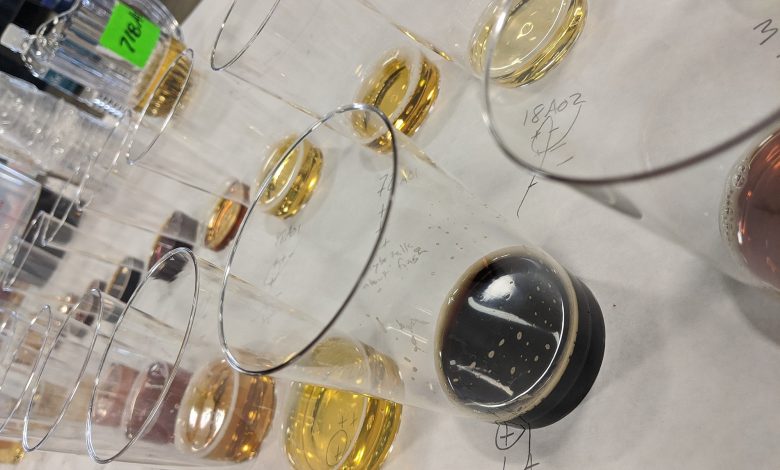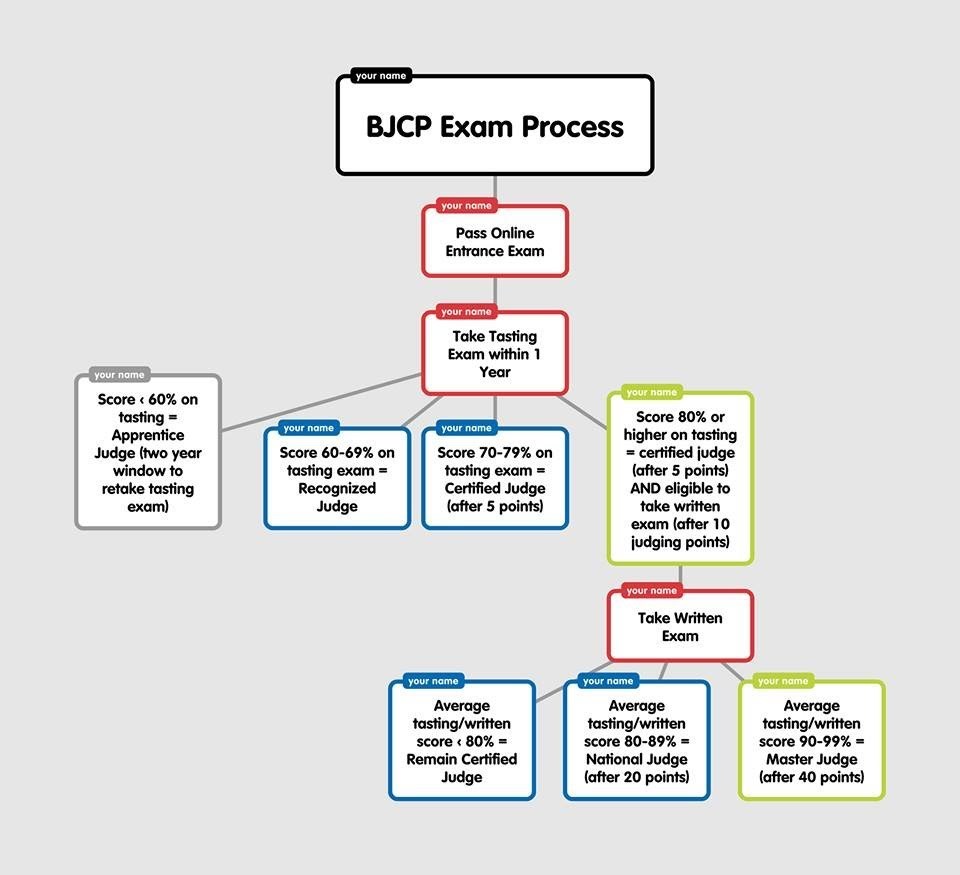
By Chris Leguizamon
Last week, myself, nationally ranked BJCP Judge Geoff Bragg and master-ranked BJCP Judge Oleg Shpyrko took readers through two of the Beer Judge Certification Program’s trio of examinations, the Entrance Examination and the Beer Judging Examination. Today, we are taking an in-depth look at the most challenging of the bunch, the Written Exam. It seems simple on its face, but even if you have studied like crazy and know everything you need to know to pass, it takes some technique to pass. But don’t worry. We have tips for you that we’re happy to share so you can do your very best!
The Written Exam
The beauty of the BJCP program is that it requires experience and practice to reach the next level. Unlike the Cicerone Certification Program where enrollees may schedule their next exam after passing the previous, BJCP requires judges to earn at least 10 judging experience points before signing up for the Written Exam.
Judging experience points are awarded at BJCP-sanctioned competitions at the rate of half-a -point per session. Sessions are typically divided into morning, evening or night-time periods during which a panel of judges evaluates one or more flights of beer entries. If a judge can only attend one session for the entire competition they will one point, which is the minimum BJCP can award. It’s double the half-point-per-session rate, but doing the bare minimum will not get someone where they want to go in this program, and there are plenty of opportunities too get the most out of taking part in competition judging.
During a multiple-day competition like QUAFF’s America’s Finest City Homebrew Competition or the American Homebrewers Association’s National Homebrew Competition, it’s common for individuals to judge two sessions in a day and perhaps even sit in on a “best of show” panel, then come back the next day to judge again. In that case, a judge will earn the maximum of one-and-a-half points per day and, by the end of the weekend, add three points to their records, which is pretty freaking rad. Another way to earn points is by attending continuing education courses like the ones Oleg has conducted virtually each month to receive non-judging experience points.
Those who score at least 70% on the Tasting Exam and earn five experience points (with at least two-and-a-half earned through judging) will achieve the level of “Certified Judge”, which is the rank I currently hold. To qualify for the “National” rank or higher, a judge must score at least an 80% on the Tasting Exam and accumulate 10 judging experience points. Again, the beauty of this program is that it can’t be rushed. You must grow with it and continue learning along the way.
Let’s break down the Written Exam. This in-person 90-minute exam consists of 20 true-or-false questions and five essay questions. Brilliantly organized, the true-false questions pertain to BJCP structure, including judging levels, judging process and the ethics every experienced judge should know and adhere to. Twenty true-false questions will be plucked from the 124 included in the BJCP Study Guide, and they can range from simple things such as whether or not one can obtain the BJCP Recognized rank without first acquiring judging-experience points, to more nuanced questions like weather it’s acceptable to request a second bottle during judging to give the entry a fair chance at being judged accurately if the first bottle of said beer is a “gusher” or tastes infected. You won’t actually gain any points during this section, but each incorrect or omitted answer will deduct a half-a-point on your overall score. It is expected that all judges know the ins and outs of this program like the back of their hands!

With the ideological portion of the test out of the way, it’s time to get down to the meat and potatoes: the essay questions. Each query in this quintet accounts for 20% of one’s overall score. Because key aspects at the root of this program were to develop a way for homebrewers to improve on the beers they were making and celebrate the diversity of styles, there will be two technical questions related to ingredients or the brewing process, two questions related to beer styles, and one pertaining to a full beer recipe (i.e. ingredients, targeted statistics, procedure, desired characteristics).
Let’s talk about what types of essay questions you should expect. For the ingredients and brewing process group, the program is looking for examinees to prove a deeper knowledge of the four main ingredients of beer (hops, malt, water, yeast) and how they can be utilized and adjusted. You might see an essay question on the importance of water chemistry in beer or the mashing process, including times, temperatures and techniques.
For the styles and characteristic comparison, you will be given three fairly similar styles (e.g. English porter, Munich dunkel, Schwarzbier) and tested on four areas. First, you will need to provide the parameters of each style: ranges for ABV (alcohol-by-volume), IBU (international bitterness units), original gravity and SRM (standard reference method). Next, you will need to provide a classic commercial example of each from the BJCP Guidelines, followed by a full breakdown of descriptors as presented in the guidelines (aroma, appearance, flavor, mouthfeel). Finally, you will compare and contrast the ingredients, process and even the history of each of the three styles presented to you. There will most likely also be an essay question delving deeper into those characteristics. For instance, you may be asked to expand on a beer style’s phenolic, cloudiness or low head retention.
Then comes the last part, the question that shakes every exam taker to their very core: providing an all-grain beer recipe, complete with start-to-finish procedures. You must be ready to write out a list of ingredients with quantities, noting how they were calculated and providing procedures along with target parameters for a beer style provided to you. That’s right, you don’t even get to pick the style, so you’ll want to have a rolodex of BeerSmith recipes in the back of your mind.
After completing the Written Exam, the average of your scores on the tasting and written examinations will determine our rank. If you average less than 80%, you will remain a “Certified Judge”. If you have an average score of between 80-89% plus 20 judging experience points, you will rise to the rank of “National Judge”, while the prestigious rank of “Master Judge” is reserved for individuals with an average score of 90-99% and 40 experience points. Everyone in the program repeats the Tasting and Written Exams multiple times. It’s a key aspect of the program that makes BJCP more than a certification mechanism, but a lifelong journey marked by beer-education and appreciation.
Geoff’s Pro-Tips: The 20 true-or-false questions come from a defined set in the BJCP Style Guide. You’ll want to know these in your sleep so that you can spend time on the rest of your exam. The essay questions are also defined in the style guide, and your study for this part of the written exam needs to include writing out your essay-question answers by hand. You will be writing for 90 minutes straight on exam day and most of us don’t write much by hand these days. Train for writing by hand like you would for a marathon. Make sure your handwriting is legible so you don’t annoy the grader. Manage your time, know how long each answer takes you, and make sure you answer all parts of the essay questions.
Chris’ Pro-Tips: There is so much to learn and answer that I started looking to some awesome BJCP judges that have created online courses to help examinees achieve solid scores. Check out Geoff’s website for valuable tips.

